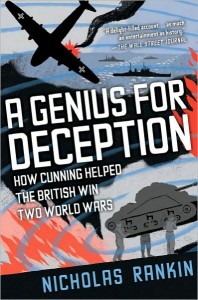
In A Genius for Deception, author Nicholas Rankin uncovers the British use of camouflage, fraud, deception, propaganda, and counter-espionage throughout the First and Second World War. He builds his narrative in chronological order. Beginning with the First World War, Rankin depicts the personal efforts of dozens of unique individuals struggling against an enemy abroad. His narrative favors obscure misfits, such as painter-turned-camouflager Solomon J. Solomon, as well as legendary figures such as T.E. Lawrence, George Bernard Shaw, and Winston Churchill. The examination of disparate stories requires reeling narrative leaps across geographical space, such that one page focuses on creating dummy corpses in France while the next leaps to the Mediterranean to study guerrilla tactics. On all fronts Rankin locates protagonists with pluck and gumption--and occasionally enough luck to pull off their tricks. The British civilians and soldiers try just about anything once in order to defeat the Axis. The range of characters includes Joan Pujol, a double-crossing spy sending Hitler bad information, and Dudley Clarke, a fastidious and imaginative staff officer masking the true strength of the British armed services in Egypt. The story of A Genius for Deception partly becomes the story of Dudley Clarke, as no one besides Churchill in the Second World War seemed as intent to fool the Axis powers at every turn. Not all gambles paid off, but they certainly kept Rankin's protagonists occupied throughout the war.
In the UK, the book's title changes to Churchill's Wizards: The British Genius for Deception 1914-1945. I suppose that Churchill's name might sell more books in Britain than in the U.S., but I think it is a misleading title. Churchill features prominently throughout the book, but more as one of many operators rather than leader of a coven.
The book works best when Rankin describes the early battles of the British in the Second World War. Here, the author takes advantage of his own family history (he had two relatives fighting at the time) to place cataclysmic battles in personal perspective. The book works less well when Rankin attempts to defend his thesis: namely, that the British possess a cultural taste for cunning and deception that helped them win major global conflicts. He provides evidence of cunning and deception, but only weak explanations of why the British version of these traits surpasses that of others. More interestingly, I think he makes an error of causal inference; by that, I mean he attributes the use of deception tactics to helping win the war, but that the tactics more correctly helped save lives. If a German bomb struck a fake tank rather than a real one, it made little difference to the outcome of the war, but a tremendous difference to the individuals inside the tank.
Winning a war is hard to do. It better serves human imagination if we know that the Allies won both the First and Second Worlds Wars with sheer strength, and not sleight of hand.
 RSS Feed
RSS Feed